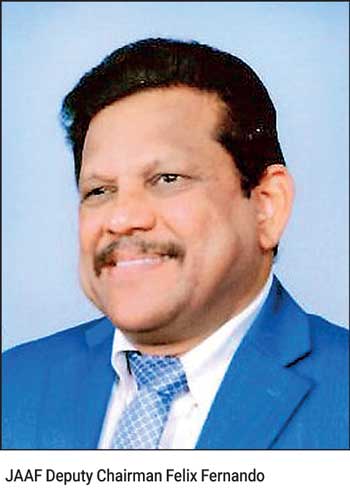Monday Feb 23, 2026
Monday Feb 23, 2026
Saturday, 29 October 2022 00:00 - - {{hitsCtrl.values.hits}}
 The crucial apparel sector is urging the Government to fast track the finalisation of Free Trade Agreements (FTAs) to ensure resilience and boost exports amidst stiff competition and new global challenges.
The crucial apparel sector is urging the Government to fast track the finalisation of Free Trade Agreements (FTAs) to ensure resilience and boost exports amidst stiff competition and new global challenges.
With fears of a global economic recession looming, the Joint Apparel Association Forum (JAAF) said yesterday it is actively stepping up engagement with top Government and Foreign Ministry officials to expedite negotiations on FTAs to help boost exports and strengthen the industry’s resilience.
“In a challenging environment, it is essential for Sri Lankan apparel entities to diversify their markets. Hence a central focus for our discussions with the Government has been the urgent need to finalise FTAs with countries like China, India, Japan and Australia,” JAAF Deputy Chairman and Omega Line Managing Director and CEO Felix Fernando said.
He said JAAF was pleased to note that the Secretary to the Prime Minister has been appointed to head a task force to expedite the Chinese FTA, and we are already seeing promising signs of progress. “We are also pleased to note that JAAF has already been called in for these discussions although they remain at a preliminary stage at present,” he added.
It was pointed out that August saw a 20% increase in export turnover generated by the apparel sector and if this trend continues, earnings are likely to increase to approximately $ 5.6 billion by the end of 2022.
“However, it is difficult to anticipate industry performance moving into 2023, given the geo-political tensions and economic volatility created by the situation in Europe – which is home to many of Sri Lanka’s most valuable markets. Currently, the US, EU and the UK comprise about 86% of our total exports,” Fernando explained.
“We also must remember that at present, Sri Lanka is not competing on a level playing field. Our main competitors, countries like Bangladesh, Vietnam and some African nations have duty concessions in global markets, which we do not have. Sri Lanka’s only concessions are for the UK and the EU markets, and those come coupled with a variety of strict conditions pertaining to the origin of raw materials which means that utilisation of these preferences remain around 50% for apparel,” Fernando added.
In that context he emphasised that securing new FTAs can help reduce barriers for Sri Lankan apparel exporters to diversify, hence the Chinese FTA is the first priority.
“We hope to gain clarity on a timeline for these negotiations from the Department of Commerce in the coming weeks, but further progress will also depend on our sovereign debt restructuring negotiations with China,” he said.
It was pointed out that further trade concessions will help to better integrate Sri Lanka with regional markets. “If for example we are able to penetrate the Indian market, even 10% would be equivalent to 100 million people, where we are presently limited to supplying just 8 million pieces. JAAF has reiterated its request to have this quota increased.
“There’s also opportunities to lobby for the inclusion of apparel into the new round of Canada’s GPT+ scheme. To move forward on such opportunities, we definitely require the support of the Government and diplomatic corps,” Fernando said.
In terms of how the economic downturn is impacting orders from the US and EU, JAAF Deputy President said both markets recorded strong sales last year but they may have overestimated demand as most buyers’ inventories are still full. “Thus, they don’t want to restock for at least another four to six months,” he said.
Recently, the US increased its lending rates by 0.75%, and there is a possibility that certain commodity prices might decline. If that happens, this whole situation can change, but it’s still too early to predict.
Fernando pointed out that logistics and energy costs increased exponentially not just in the US but also in the EU, primarily due to the Ukraine war. “If these issues ease by December, orders may pick up. But this is a global issue and not unique to Sri Lanka. Although the first eight months of the year had a growth in exports, we envisage a decline in our apparel exports by 25-30% for the remainder of 2022,” he opined.
“This is the reason it is crucially important for the Government to be proactive about FTAs, as with easier access to these markets, exporters would be more competitive. We expect help from the Government in these areas to help exporters,” Fernando stressed.